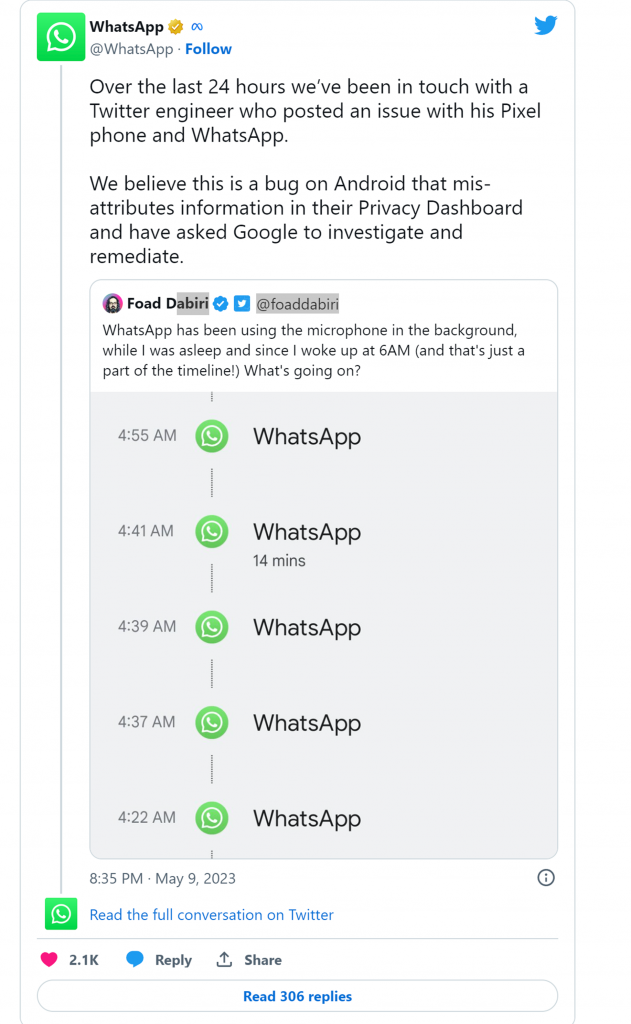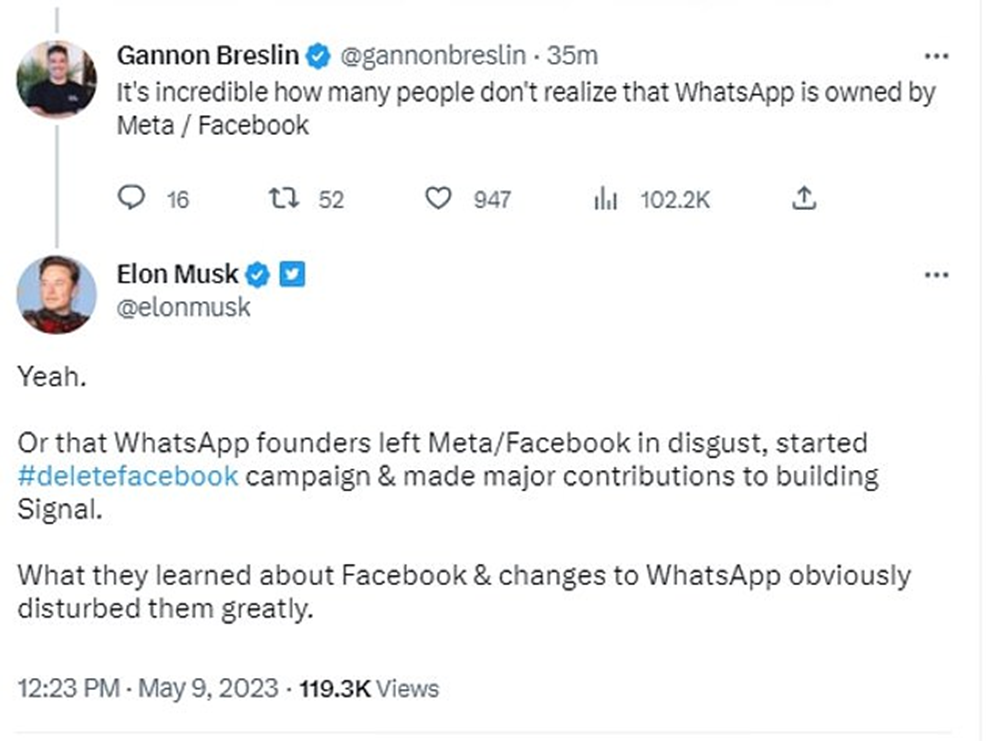
[ad_1]
A Twitter executive is facing a privacy issue with WhatsApp.
An ex-Google engineer and current chief technology officer at Twitter discovered a potential data privacy issue with WhatsApp on his Pixel 7 Pro smartphone. According to Google’s privacy controls, the app used his microphone at least nine times overnight, without any interaction from the user.
Foad Dabiri tweeted about the issue over the weekend, posting a screenshot showing WhatsApp accessing his microphone intermittently in the early morning hours. Given the history of privacy issues at WhatsApp’s parent company, Meta (formerly Facebook), this issue, as you might expect, has angered many Internet commentators.

The Twitter community quickly grabbed their pitchforks, and eccentric billionaire Elon Musk joined in. The head of Twitter hasn’t been shy about expressing his opinions about Meta’s privacy practices, going so far as to say that WhatsApp can’t be trusted.

Musk’s tweet has since gone viral and garnered thousands of comments. Gannon Breslin responded, “It’s unbelievable how many people don’t realize WhatsApp is owned by Meta/Facebook.”
When another user wrote that it’s amazing how many people don’t know WhatsApp is owned by Meta, Musk explained that “the founders of WhatsApp left Meta/Facebook in disgust, launched the #deletefacebook campaign, and made significant contributions to the creation of Signal.” He also expressed doubt about the direction Meta was taking for the chat app after taking control of its development, adding: “What [основатели WhatsApp] learned about Facebook and the changes in WhatsApp, obviously, they were very shocked.”
While Musk and other commentators have hinted at long-standing conspiracy theories that Facebook is spying on its users, WhatsApp itself has pointed to a bug in Google’s privacy monitoring software as the likely cause of Dabiri’s problem. The company believes the log entries showing WhatsApp’s access to the microphone are misattributed and has contacted Google for help in resolving the issue.
“We believe this is a bug in Android that is misreporting information in their privacy panel and have asked Google to investigate and fix it.
“Users have full control over their microphone settings. Once granted permission, WhatsApp only gets access to the microphone when the user makes a call or records a voice note or video – and even then, these messages are end-to-end encrypted so WhatsApp can’t hear them.
The Privacy Dashboard is a service owned by Google that allows users to see which apps are accessing their data, which have permission, and when.
A WhatsApp tweet about Dabiri’s message suggests that Google’s privacy panel is to blame for the problem.
The WhatsApp security issue is not new. Messenger often becomes the target of scammers and hackers. Let’s see how secure WhatsApp is and how you can increase the protection of your account.
In 2021, the version of the popular messenger for Android included two critical vulnerabilities discovered . Their operation allows you to remotely execute malicious code on the device and steal user data. These vulnerabilities have been fixed in the latest WhatsApp update, so it’s important to always have the latest versions of apps.
In addition, in April 2023, WhatsApp implemented several new features to enhance account security . One of them is called Device Verification and is designed to provide better protection against account hijacking attacks. The feature will automatically block attackers from taking over your account using invisible internal checks.
Another feature is called “Account Protection”. It will act as an additional security check when WhatsApp accounts are linked to new devices. The feature will notify users of unauthorized account transfer attempts and request appropriate confirmation.
The third feature is called “Automatic verification of security codes”. It allows you to instantly make sure that the correspondence with the selected contact is protected by end-to-end encryption. WhatsApp implemented end-to-end encryption 7 years ago in April 2016 and rolled out end-to-end encrypted chat backups on iOS and Android in October 2021.
To protect your WhatsApp account from spying and fraud, experts recommend following a few simple rules :
- Install only official WhatsApp apps and services from trusted sources.
- Back up messages and media on Android and iOS using end-to-end encryption.
- Enable two-factor authentication for your WhatsApp account.
- Do not share your phone number or verification code with anyone, even if they claim to be a WhatsApp employee.
- Do not open suspicious links or files sent via WhatsApp.
- Check security codes with contacts you communicate with.
- Use the Signal app for a higher level of privacy and security.
By following these tips, you can keep your WhatsApp account safe from potential threats and enjoy secure communication with friends and family.
[ad_2]
Source link
www.securitylab.ru